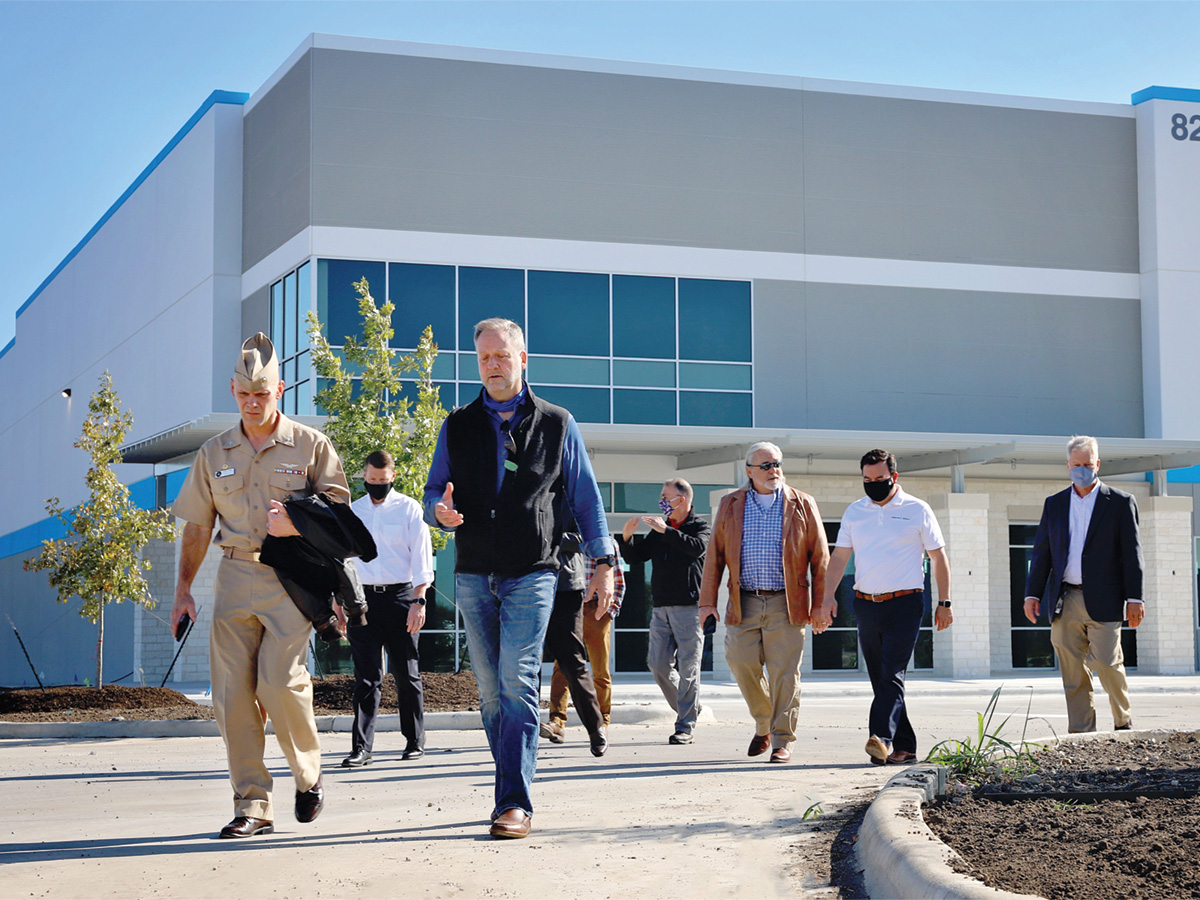Recommendations by the CRE® Consulting Corps
The Counselors of Real Estate’s Consulting Corps delivered strategic guidance and an action plan to Naval Air Station Oceana. The fourth in this 4-part series provides a Hybrid Analysis for implementation of Enhanced Use Leasing, Shared Services Agreement, and City-Base transaction, as well as Recommendations, including the Critical Path and Performance Criteria.
Read: Part 1 | Part 2 | Part 3
Watch: City of Virginia Beach
Hear from Brian Solis, Special Projects Manager, City of Virginia Beach, on March 31, 2021. The City is a key partner in this initiative.
Hybrid Analysis
Naval Air Station (NAS) Oceana desires to show immediate progress through Future Base Design. Furthermore, a looming opportunity with Dominion Energy will require a decision quickly. If selected, completing a Master Lease with the City will require at least 90 days to negotiate, and even longer for a City-Base Transaction. Assuming the Navy desires to proceed with a ground lease to Dominion Energy, the only way to accommodate Dominion Energy’s timeline is through an EUL. Executing an EUL with Dominion Energy does not preclude the Navy from entering into a Master Enhanced Use Lease with the City of Virginia Beach, nor does it preclude subsequently entering into a City-Base/EFI Transaction with the City.
If the Navy proceeds to execute Enhanced Use Leases (EULs) with both the City (up to 5 years) and Dominion Energy (+5 years) and elects to continue exploring a City-Base/EFI transaction with the City, a hybrid approach would be appropriate. The steps in a hybrid approach might be as follows.
- Begin Negotiating the EUL transaction with Dominion Energy immediately.
- Develop an RFP for a Master Tenant for the remaining portions of the Installation that can be leased (we recommend you include as much of the installation as possible).
- If the City of Virginia Beach (or its assign) is selected, enter into negotiations for a lease not to exceed 5 years.
- Make the development of a Master Plan for a City-Base/EFI Transaction, transaction facilitation support, and a shared services agreements (10 USC 2679) part of the compensation.
- When the lease is executed, the first steps in the City-Base/EFI Planning process, described previously, begin.
The benefits of a Hybrid process include the following.
- The Navy’s Future Base Design Initiative achieves immediate results on two fronts.
- The terms of the City’s EUL may substitute for the non-binding letter of intent with the City, as the lease terms will be binding and address all the elements of the letter of intent.
- Lease compensation can include funding for not only the Master Plan but also many of the First Steps and the Initial Concept Stage of the Critical Path, plus the financial benefits of a shared services agreement.
- As part of the City-Base/EFI Transaction, the City would assume responsibility for administering both of the Dominion Energy leases through an Estoppel (an agreement that both parties will honor the existing terms of the lease).
- With up to a 5-year term, the timeline would support any additional time needed to secure approvals and special legislation for a City-Base/EFI Transaction.
- The consideration under the lease could be credited to the FMV consideration for the City-Base/EFI Transaction.
Other benefits, not contemplated previously, will likely manifest under a hybrid approach. Regardless, if the Navy desires both early success and the ability to execute a City-Base/EFI transaction, the CRE® Consulting Corps team recommends a Hybrid option.
Immediately begin negotiating an EUL with Dominion Energy
Critical Elements for Success
The elements critical for success of a hybrid approach are very similar to those listed in a City-Base/EFI transaction with a few antecedents.
- Immediately begin negotiating an EUL with Dominion Energy (consider including the EDA in your discussions as an advisor).
- Develop a solicitation for a master developer with the attributes outlined in the CRE® Consulting Corps Out-Briefing on 7 August, plus the recommendations in this report.
- If selected, negotiate an EUL with the City of Virginia Beach for up to 5 years.
- Ensure the terms of the lease compensation include a shared services agreement (10 USC 2679), plus the first steps, initial concepts and planning phases in the critical path table (detailed previously) as lease compensation under a City-Base/EFI transaction.
- Study, question and take appropriate steps in accordance with the SAF/IEI Lessons Learned document.
- Finally, jointly hire a facilitator(s) familiar with the City-Base/EFI transaction, Commercial Real Estate Metrics, City Government, and Installation BOS Operations, tasked to guide both parties through the critical path.
The CRE® Consulting Corps team believes these critical elements will afford the best options for success under a hybrid approach beginning with the Navy’s existing authority under 10 USC 2667 and culminating with a City-Base/EFI transaction. The result of this approach would generate an initial win and ensure the long-term benefits the Navy desires under its Future Base Design Initiative.
Benefits & Difficulty Matrix
The CRE® Consulting Corps have explored several options that would relieve NAS Oceana of cost burdens and/or revenue offsets to Base Operating Support (BOS). Each option carries some measure of long-term benefit and difficulty that can be summarized the following way.
| Options | Benefit | Difficulty | Rating |
| Shared Services Agreement | 2.0 | 3.0 | 5.0 |
| Enhanced Use Lease | 2.0 | 2.5 | 4.5 |
| City-Base/EFI Transaction | 4.0 | 1.5 | 5.5 |
| Hybrid Approach | 4.5 | 2.0 | 6.5 |
| Best Score (Highest Benefit/Lowest Difficult) | 5.0 | 5.0 | 10.0 |
Shared Services Agreement (10 USC 2679)
Shared services agreements offer the Navy the ability to negotiate directly with a municipal entity to transfer responsibility for some DPW activities (i.e., fire, police, emergency services, roads maintenance, etc.) to the local municipality.
The benefits of a shared services agreement are associated with the Navy’s ability to tap into municipal economies of scale to provide manpower and other resources at a lower cost. Furthermore, the City is not subject to Federal Acquisition Rules and can provide equipment and materials using their acquisition procedures. The primary difficulty is the time required to negotiate agreements with municipal governments for various services, quantifying the true cost to the Navy for comparison purposes and bureaucratic resistance to change. Fortunately, there are examples of successful shared services agreements across the spectrum of military installations that suggests these agreements can be achieved.
Our rating suggests while a shared services agreement can be financially beneficial to NAS Oceana, the impact of such an agreement may not result in a substantial reduction of BOS costs over time.
While a shared services agreement can be financially beneficial to NAS Oceana, the impact of such an agreement may not result in a substantial reduction of BOS costs over time.
Enhanced Use Lease (10 USC 2667)
Enhanced Use Leases afford NAS Oceana the ability to enter into a lease with a non-DoD entity in exchange for cash lease payments, or payments in-kind. In-kind payments can result in direct funding for services, projects, equipment or even paying BOS bills (utilities, grounds keeping, etc.), and are preferred over cash payments that must be shared equally with headquarters and may not be reinvested at the installation.
EULs have a positive impact in two ways: They generate revenue and relieve NAS Oceana of some portion of BOS responsibility (i.e. grounds maintenance). Over time as more land is leased, revenues and BOS relief can grow to a significant sum. The challenges associated with these revenue streams include the time required to lease portions of the installation. Furthermore, the land development work required of the tenant is significant. There are very few “development ready” sites. That suggests the tenant will incur significant development costs that could take years to accomplish before the site could be developed for profitable use. Hence, the tenant will require a significant discount to market value for leasing “raw,” or poorly located, land versus leasing “finished” parcels with zoning, utilities, roads, etc. in place.

View of Central Campus, an area that could be redeveloped with help from the private sector.
The CRE® Consulting Corps team’s rating reflects the likelihood that the absorption of the sites under consideration for an EUL will require a significant absorption period (at least 10 to 20 years). Hence, financial benefits may accrue only slowly over time. While entering into a master lease may shorten the absorption period and eliminate the need to interface with the private sector, the best parcel will already be spoken for (Dominion Energy) the remaining sites will require significant planning and/or improvement to be marketable. We believe the most shovel-ready parcels with the greatest opportunity for broader market interest may be under existing structures within the installation’s Central Campus, and on either side of the Commissary.
The most shovel-ready parcels with the greatest opportunity for broader market interest may be under existing structures within the installation’s Central Campus and on either side of the Commissary.
City-Base/EFI Transaction
The City-Base/EFI Option has been proven to generate significant BOS relief almost immediately upon implementation. However, it will require special legislation to obtain the authority to execute. The transaction entails a transfer and leaseback of all or portions of the installation. While it takes time to execute, the results will accrue quicker than they might under a shared services agreement or an EUL.
Our rating accounts for the immediate benefit realized when the Navy is relieved of payroll burdens and the Federal Acquisition Regulation (FAR) to precure BOS services. Additional benefits accrue when compatible development spreads costs to private sector tenants. Also, if land is sold or leased, the proceeds are used in-kind to further reduce the cost to the Navy. The implementation rating reflects the need for strong, capable leadership, and support at all levels inside the Navy; plus, similar leadership from stakeholders, municipal, state and federal representatives. Essentially, this will require an all hands effort to obtain the authority to execute. Normally something of this magnitude would be extremely challenging to achieve. Fortunately, there is a precedent and model to follow in the Brooks City-Base/EFI Case Study.
Hybrid Approach
The CRE® Consulting Corps team believes this approach affords NAS Oceana the best opportunity to achieve meaningful results without being forced to select a single direction. This approach would entail moving forward with an EUL with Dominion Energy and a Master Lease RFP. Should the City be awarded a Master Lease, Oceana should obtain from the City a shared services agreement, master planning services, a commitment to developing a City-Base/EFI transaction for NAS Oceana, and project funding assistance for the first steps, and initial concepts and planning stage.
Our rating reflects the belief a Hybrid approach would result in near-term financial success from the lease with Dominion Energy and negotiating a Shared Services Agreement. The difficulty rating is only slightly less than an EUL alone as it incorporates existing authorities and working jointly with stakeholders to obtain congressional authority to enter into a City-Base/EFI transaction. A Hybrid approach provides the greatest flexibility to NAS Oceana without delaying progress.
Recommendations
The CRE® Consulting Corps team recommends the Navy undertake the following at NAS Oceana:
- Future Base Design will require a coalition of participants and should be viewed as campaign versus a battle.
- A critical partner will be the City of Virginia Beach.
- NAS Oceana should align closely with the City of Virginia Beach throughout this process and develop a joint communication plan to stakeholders.
- NAS Oceana should execute an EUL for the former Horse Stables parcel with Dominion Energy.
- NAS Oceana develop an RFP for a master tenant for all or most of the installation (under 10 USC 2667) that can provide the following:
- Master planning,
- Tax-exempt project and infrastructure financing,
- Installation-support services (2679),
- Shared services, and
- The capacity to execute a City-Base/EFI Transaction.
- If the City is selected, work with them to bring in an independent facilitator with subject matter experts familiar with EULs, shared services agreements, and City-Base/EFI transactions.
- The facilitator should be tasked to guide the parties through the process with the ultimate goal to execute an agreement that achieves the parties’ objectives.
- Encourage the City/Community to explore funding options for an updated Joint Land Use Study that would aid master planning efforts and benefit a Future Base Design Project through the DOD Office of Economic Adjustment.
Critical Path & Timeline
The critical path for these recommendations is described previously for each option. If a hybrid approach is selected results could accrue immediately with a lease to Dominion Energy. However, if that approach is selected, more meaningful results could be achieved within 12 months of securing the authority to execute at City-Base/EFI transaction.

Future Base Design should incorporate industry best practices to ensure NAS Oceana remains the Navy’s Master Jet Base.
Performance Criteria
The CRE® Consulting Corps team recommends NAS Oceana use the Cost Baseline study described previously as the benchmark to measure performance. The cost baseline allows the Navy to compare its true and total cost for installation management against the expense reimbursement lease payments to the Landlord under a City-Base/EFI Scenario. In addition, if any other option is selected, the financial benefits of cash or in-kind services can be evaluated against total cost for comparison.
Funding
Future Base Design, like most initiatives, requires analysis, coordination and resources. If the Navy elects to partner with the City of Virginia Beach Economic Development Authority in any fashion, neither party will escape the reality that federal and municipal budgets are under pressure. It may be difficult for any tenant, let alone the EDA, to directly fund rent payments, and asking local taxpayers to contribute to the cause will be equally daunting. However, the Office of Economic Adjustment or OEA is a likely funding source for various types of actions that could be counted as in-kind services, including:
- Compatible Use Studies
- Community Investment
- Military Installation Sustainability
- Industry Resilience
The OEA’s website encourages defense communities to “complete a Compatible Use Study” if it has not been updated in the last five years. The Consulting Corps team encourages the Navy to work with the EDA to identify funding sources for services that would ultimately benefit both the EDA and the Navy.
Summary
The Counselors of Real Estate Consulting Corps greatly appreciates the opportunity to support and serve the U.S. Navy at NAS Oceana. After more than three months of analysis, research, physical inspection, and interviews with the Navy and key stakeholders, we believe the Navy has a rare opportunity to make a bold move that will benefit this and other Navy installations as well as the other services within the Department of Defense.
We believe the key components for success are present in this instance. NAS Oceana has strong leadership in place. The local community and State of Virginia stand ready to support any initiative the Navy wishes to propose, and requisite federal representatives are not opposed to working with their constituents to benefit the community. We found no roadblocks to any creative ideas the Navy wishes to advance. We find this situation to be extremely rare as there is nearly always opposition to change within communities facing such significant amendments to the status quo.
For these reasons we believe it would be in the best interest of NAS Oceana to proceed with its plan for executing EULs with Dominion Energy and an entity that can provide a master planning services like the City of Virginia Beach. We also believe the Navy is in an excellent position to take advantage of its broad stakeholder support and simultaneously pursue shared services agreements and City-Base/EFI transaction authority following the steps outlined previously.
The CRE® Consulting Corps believes the Navy has nothing to lose and everything to gain by expanding the ambitious moves it started through its Future Base Design Initiative. •
The Consulting Corps is The Counselors’ public service initiative. Members of The Counselors volunteer their time and expertise to help nonprofit and government entities by providing objective analysis, adaptive reuse strategies, and realistic action plans to leverage and maximize performance of real estate assets. For more information or to suggest a project that could benefit from Consulting Corps assistance, contact Samantha DeKoven. To learn more, visit cre.org/initiatives/consulting-corps.


 The CRE® Consulting Corps tours Brooks City Base in San Antonio.
The CRE® Consulting Corps tours Brooks City Base in San Antonio.



